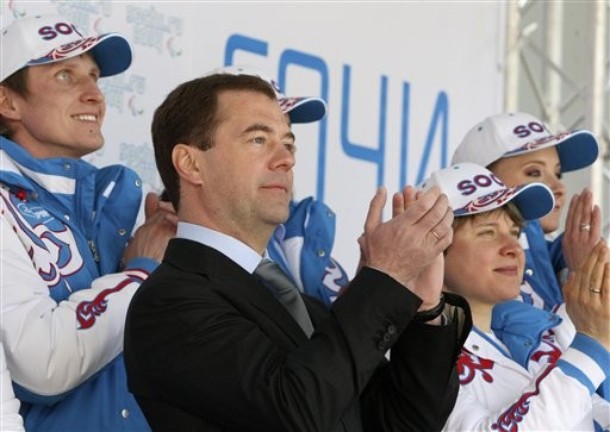
With summer arriving, it might seem early to be thinking through the politics of the 2014 Winter Olympics. But the next Winter Games are to be held in Sochi, Russia, just a few miles from Abkhazia, a territory Russia broke off from Georgia by military force in 2008. Simply put, this will be tricky. Preparations need to begin as soon as possible.
Few are suggesting that the United States and Europe boycott the Sochi Games, a la Moscow in 1980. But attending the 2014 Olympics under today’s circumstances would make all of us complicit in cementing in practice Russia’s changing European borders by force, even if we reject those changes in principle.
Imagine the practicalities. Abkhazia is a part of sovereign Georgian territory according to every country in the world except Russia, Venezuela, Nicaragua and Nauru. Already, Olympic construction workers are being housed in Abkhazia. By 2014, we could see housing for tourists, regular border crossings between Russia and Abkhazia without a hint of Georgian sovereignty, high-visibility symbols of Abkhaz "statehood" such as flags and travel documents, and the presence of the Abkhaz and South Ossetian "presidents" at Olympic ceremonies — alongside U.S. and European leaders.
To avoid the unpalatable choices of boycott or complicity, the United States and Europe should get to work on a third possibility: that the Sochi Olympics could become a catalyst for resolving long-standing conflicts, bringing the Caucasus region into the 21st century. Russia’s interest in a successful Olympics — an interest that we share — should be a powerful incentive for consigning to history Moscow’s zero-sum, divide-and-rule approach to the Caucasus. This would surely be the best outcome for the states and peoples in the region, for Moscow, for the athletes and for the Olympics.
To get there, four steps come to mind:
First, we need to be clear that in today’s Europe, the change of borders by force will not be recognized. Diplomacy should begin now so that at this autumn’s NATO and U.S.-E.U. summit meetings, we can agree on a formal non-recognition policy pertaining to Abkhazia and Georgia’s other breakaway province, South Ossetia.
Although details can be fine-tuned, such a policy could encompass: non-recognition of statehood; non-acceptance of travel documents issued by the two territories; no official travel to these areas unless the access is from Georgian territory; no investment in, or trade with, business entities based in these territories; and no U.S. or E.U. visas for officials of the breakaway governments, unless it is on terms the United States and Europe decide upon. But it should be equally clear that the West is prepared to lift these policies quickly should there be agreement with Georgia on internationally supervised autonomy.
Second, in parallel with a non-recognition policy, the United States and Europe should give a renewed push to the Geneva process of negotiations over Abkhazia and South Ossetia. First launched after the E.U.-brokered cease-fire in 2008, the talks are foundering. The United States hit the reset button in early 2009; it is time for Russia to reset as well.
Third, efforts should be reenergized to resolve the region’s other major conflict: the Nagorno-Karabakh territory, which is disputed by Armenia and Azerbaijan. This is an issue on which Russia, the United States and Europe have been working together well for years, and the outlines of a possible settlement have long been on the table. An Azeri-Armenian settlement could spur travel, trade, investment and economic prosperity in the region. A ministerial meeting of the Organization for Security and Cooperation in Europe’s Minsk group, led by Secretary of State Hillary Clinton and Russian Foreign Minister Sergei Lavrov, should be convened to renew pressure toward a settlement.
Fourth, the OSCE, the European Union and the United States should put far greater resources into strengthening democratic institutions, supporting nongovernmental organizations, monitoring conflict zones, fighting corruption and building trade and investment throughout the Caucasus. The next elections in Georgia — where democratic institutions are strongest, though still fragile — should be heavily monitored to make them as clean as possible. We should step up calls for genuine democratic processes in Azerbaijan and Armenia. Washington should increase Freedom Support Act funding and team up with the E.U. Eastern Partnership initiative. Healthy political and economic development will increase incentives for resolving conflicts and serve as a magnet for breakaway territories to seek closer integration.
If the United States and Europe do nothing, we will surely face an untenable situation in 2014. But by acting now, we can stake out a position based on democratic values and increase the prospects for reaching long-term solutions well before the Sochi Games.
Image: 610x_8.jpg
